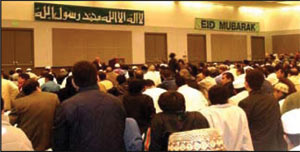Muslim Americans Celebrate
Eid-al-Adha
By Mona Shadia
CA
 Eid prayers at the Los Angeles
Convention Center
Eid prayers at the Los Angeles
Convention Center |
When seen from above, it's
like an ocean of pilgrimage: nearly 2.5 million Muslims
in white clothing, standing side by side and chanting, "I'm
here, God, at your service."
On Saturday, Muslims gathered at the Corona-Norco Islamic
Society ISCN to pray and celebrate Eid-al-Adha. Children
were following in their elder's footsteps, running toward
the mosque wearing colorful new clothing. Muslims sang,
prayed and greeted one another and wished each other a blessed
holiday and a blessed year.
"Hajj is a remembrance of the Prophet Abraham and his
family's commitment to God," said Hussam Ayloush, executive
director for the Southern California's Council on American
Islamic Relations. "Every ritual of hajj is a remembrance
to the dedication and strong faith and everything he went
through."
Hajj is the last of the five pillars of Islam. Muslims are
called on to perform hajj once in their lifetime if physically
and financially capable.
And Muslims here at home and around the world join the pilgrims
in Mecca by celebrating following the hajj.
"It feels good to be around the Muslims and it's a
special event for us," said Suhale Sikander of Corona.
His 7-year-old son, Zayn, smiled while holding his hand
and said, "I was praying."
For many, the celebration is a way to get together and to
represent Muslims and Islam, said Asma Mansoor of Corona.
For Muslims, the Prophet Abraham is considered to be the
father of Islam and the father of all prophets. His life
and legend are remembered through the demonstration of hajj
every year in Saudi Arabia, Ayloush said.
According to Muslims, through Abraham's life, God taught
that man can struggle in life, but survive with strong faith
and trust in God.
"God's reminder to us is if Abraham can do it, then
you should be able to do it too," Ayloush said. "God
could have shown it to us through an angel or a lesson of
scripture, but God showed it through a human being with
the same flesh and blood as us."
Mecca is the holiest city of Islam where Muslims believe
the Prophet Abraham reconstructed the Kaaba with his son
Ishmael. According to Muslims, the Kaaba was first built
by Adam. Islam teaches that the prophet later stood along
with his son and prayed to his one God and called on those
who believe in God to come and pray. Mecca is also where
Abraham placed Hager and his son Ishmael, and where the
Prophet Muhammad was born.
Muslims visit the Kaaba, which is considered to be the first
place of worship ever built on earth, Ayloush said. Muslims
don't worship the Kaaba, but when praying they point toward
the Kaaba.
"It provides the focal point of the beginning of Islam,"
Ayloush said. "According to Islam, the early followers
of Abraham prayed toward the Kaaba, it's a central place."
During hajj, Muslims perform many rituals that symbolize
the challenges Abraham went through and also some of the
challenges and obstacles human beings face throughout their
lives.
"Each of the rituals of the hajj is an attempt to remember
and learn from the strong faith and the perseverance and
trust in God that Abraham carried," Ayloush said.
Many who visit Mecca say their experience is indescribable,
that the joy and the fulfillment is overwhelming and worth
every minute of it, Ayloush said.
"It's so spiritually charging that it's difficult to
describe," he said.
And every year, men and women dress in white clothing, circle
the Kaaba and pray to God.
"When you go, you put your material life behind you
- the poor, the rich, they all look the same - doing exactly
the same rituals, walking side by side, chanting the same
thing," Ayloush said.
During hajj, Muslims stand on Mt. Arafat, which is the highlight
of hajj. Hajj cannot be complete without pilgrims standing
together on Mt. Arafat as one.
Following hajj, Muslims celebrate Eid-al-Adha where they
make sacrifice to God, as Abraham did, and they share it
with the poor, Ayloush said.
"We sacrifice as a show of gratitude to God for saving
the life of Abraham's son and for all the bounties he has
bestowed on Abraham and us," Ayloush said.
And after all, Ayloush said, hajj cannot be separated from
Eid-al-Adha as hajj in itself is a celebration and a joyous
event.
"It's hard to separate Eid-al-Adha from Hajj. The celebration
is in the middle of hajj; the actual celebration is hajj,"
Ayloush said.
(Mona Shadia can be reached at mona.shadia@dailybulletin.com
or by phone at (909) 483-8541.Muslim community celebrates
hajj, follows rituals of Eid-al-Adha. Courtesy Daily Bulletin.com)
-------------------------------------------------------------------------------------

